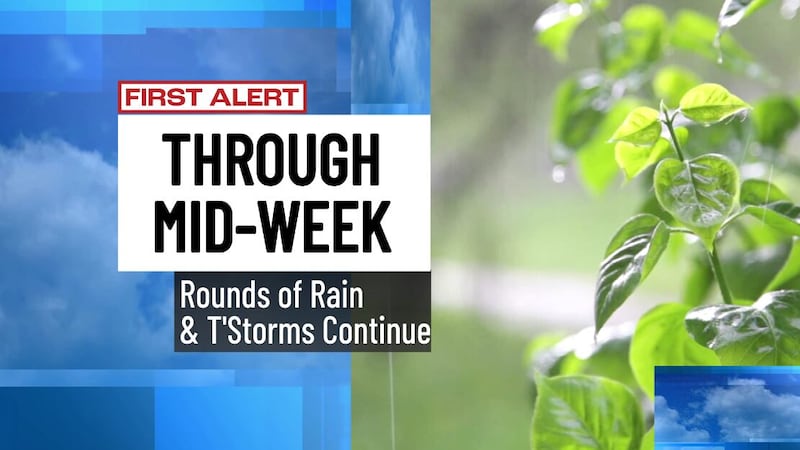Severe Storms Possible Across The Carolinas: Tracking Active Vs. Expired Weather Alerts

Table of Contents
Understanding Weather Alert Systems in the Carolinas
The National Weather Service (NWS) is responsible for issuing weather alerts across the United States, including the Carolinas. This system uses a standardized approach to warning the public about impending severe weather. The NWS employs a network of radar stations and weather satellites to monitor atmospheric conditions and issue timely warnings. Understanding this system is your first step towards staying safe during severe storms.
Different types of alerts exist, each indicating a specific threat:
- Tornado Warning: Indicates a tornado has been sighted or indicated by weather radar. Immediate action is required.
- Severe Thunderstorm Warning: Signals a severe thunderstorm producing large hail (typically one inch in diameter or larger) and/or damaging winds (typically 58 mph or greater) is imminent or occurring.
- Flash Flood Warning: This means a flash flood is imminent or occurring. Rapid flooding is possible.
- Blizzard Warning: Heavy snow with strong winds and low visibility.
- Winter Storm Warning: Significant amounts of snow, sleet, and/or freezing rain are expected.
Severity Levels: The NWS uses "watches" and "warnings" to indicate the threat level. A watch means conditions are favorable for severe weather to develop. A warning means severe weather is imminent or occurring. Warnings require immediate action.
Lead Time: Lead times vary greatly depending on the type of alert. Tornado warnings, for instance, may only offer a few minutes of lead time, while winter storm warnings might provide several days.
Alert Resources: You can receive weather alerts through several methods:
- NOAA Weather Radio: A dedicated weather radio provides continuous broadcasts of warnings and forecasts.
- Weather Apps: Reputable weather apps (like the Weather Channel app or AccuWeather) provide real-time alerts and forecasts.
- Local News: Television and radio stations provide continuous coverage during severe weather events.
Identifying Active Weather Alerts for the Carolinas
Locating current, active alerts for your specific area within the Carolinas is paramount. Reliable sources for this real-time information include:
- The NWS Website: The official NWS website (weather.gov) offers detailed maps and information for all areas.
- Reputable Weather Apps: Many weather apps offer customizable alerts based on your location.
Visual Cues on Weather Maps: Active alerts are typically displayed on weather maps using shaded polygons or specific icons corresponding to the type of alert. Pay close attention to the color-coding used, as each usually represents a different severity level.
Frequency of Checks: During periods of severe weather, it is vital to check alerts frequently—even every few minutes—to stay informed of any changes or new warnings.
Examples of Active Alert Displays: Active alerts appear differently depending on the platform. Weather apps generally use push notifications and map overlays, while the NWS website uses interactive maps and text alerts.
Recognizing and Ignoring Expired Weather Alerts in the Carolinas
Expired alerts are just as important to understand as active ones. Knowing when an alert has expired prevents confusion and allows you to adjust your actions accordingly.
Identifying Expired Alerts: Expired alerts are typically marked with a timestamp indicating when they were canceled. They often have different color-coding or visual cues than active alerts on weather maps and apps.
Common Misunderstandings: A common mistake is to assume that an expired alert means all danger has passed. Conditions can still be hazardous even after an alert expires.
Situational Awareness: Even after an alert expires, maintain situational awareness. Stay informed about weather conditions and be prepared for potential lingering hazards like flooding or downed power lines.
Staying Safe During Severe Storms in the Carolinas: Actionable Steps
Having a preparedness plan is crucial for staying safe during severe storms. This includes knowing what to do during each type of severe weather event.
Actionable Steps:
- Tornado Warning: Seek shelter immediately in a sturdy building, preferably in an interior room on the lowest floor. Avoid windows.
- Severe Thunderstorm Warning: Go indoors to a sturdy building. Avoid contact with water and metal objects.
- Flash Flood Warning: Move to higher ground immediately. Never drive through flooded areas.
Emergency Kit: Keep an emergency kit readily available containing water, non-perishable food, flashlights, batteries, and a first-aid kit.
Shelter: Knowing where to find safe shelter—such as a basement or an interior room—is vital.
Staying Informed About Severe Storms Across the Carolinas
Understanding active vs. expired weather alerts is crucial for safety during severe storms. Reliable sources like the NWS website and reputable weather apps provide real-time information. Always have a severe weather preparedness plan in place. Remember to regularly check for updates.
Don't get caught off guard! Stay informed about severe storms across the Carolinas by regularly checking active weather alerts and preparing a safety plan. Download a reliable weather app, sign up for weather alerts from your local NWS office, and develop a family emergency plan today.

Featured Posts
-
 March 26th Report Details High Fentanyl Levels In Princes System At Death
May 31, 2025
March 26th Report Details High Fentanyl Levels In Princes System At Death
May 31, 2025 -
 Who Links New Covid 19 Variant To Rising Infection Rates
May 31, 2025
Who Links New Covid 19 Variant To Rising Infection Rates
May 31, 2025 -
 Is This The Good Life Assessing Your Current Situation And Aspirations
May 31, 2025
Is This The Good Life Assessing Your Current Situation And Aspirations
May 31, 2025 -
 Mel Kiper Jr S Prediction Browns No 2 Overall Draft Pick
May 31, 2025
Mel Kiper Jr S Prediction Browns No 2 Overall Draft Pick
May 31, 2025 -
 15 Godini Rolan Garos Za Grigor Dimitrov
May 31, 2025
15 Godini Rolan Garos Za Grigor Dimitrov
May 31, 2025
